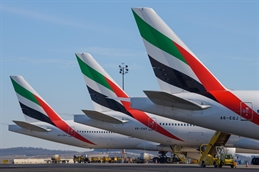
Emirates SkyCargo has operated more than 27,800 cargo flights last year as the cargo carrier worked nonstop to keep the supply chain moving — transporting essential medical and food supplies amid the disruptions brought by the coronavirus pandemic.
The cargo arm of Emirates said the very first 'preighter' flight it operated took off from Dubai to Kuwait on March 16, 2020 — operated on a Boeing 777-300ER passenger aircraft, carrying no passengers but about 34 tonnes of bellyhold cargo that was urgently required in Kuwait.
"It was the first time in the history of its operations that Emirates had operated a cargo-only flight on a passenger aircraft. Coming just four days after COVID-19 had been declared a pandemic by the World Health Organisation (WHO), EK 2503 would be the first of more than 27,800 cargo flights to be operated by Emirates SkyCargo in the year that followed," the carrier said.
Nabil Sultan, Emirates Divisional Senior Vice President, Cargo noted that it's been a year since that first all-cargo operation as he noted how the 'preighter' flights helped boost the carrier's operations amid weak passenger demand overall.
"It has been exactly one year since what was considered impossible in the air cargo industry became not just a reality but a strong operational pillar for Emirates SkyCargo. Prior to the pandemic, nearly two thirds of our total cargo was transported in the bellyhold of our passenger flights. With increasing flight suspensions and restrictions on passenger travel imposed due to COVID-19 in early March 2020, we could foresee a situation where there would no longer be adequate cargo capacity available in the market to transport essential supplies," Sultan said.
In order to bolster the cargo capacity offered by our 11 Boeing 777 freighters and make sure that the carrier is able to meet the "urgent demand" for goods such as PPE, ventilators and other pharmaceutical goods and food supplies from across the world, he noted that Emirates SkyCargo "proactively made a radical and innovative plan to utilise our widebody passenger aircraft to operate cargo only flights."
"We trialled this passenger freighter concept with a flight to Kuwait on 16 March last year. Over the next few weeks, as regular passenger operations were completely suspended, we started increasing our passenger freighter flights to a point where we had close to 90 passenger aircraft being used for cargo operations," he added.
Eventually, Sultan noted that the carrier's "passenger freighter strategy has been the backbone of our operations during the pandemic transporting cargo to more than 125 destinations across six continents."
To meet the global demand for transport of PPE and essential supplies, Emirates SkyCargo followed up on the introduction of passenger freighter services with further innovations including the loading of cargo on passenger seats and in overhead bins inside the passenger cabin and introducing ‘mini freighters’ which were Boeing 777-300ER aircraft with seats removed from Economy Class to make more room for transporting cargo.
Emirates SkyCargo currently has 16 Boeing 777-300ER mini-freighters for cargo operations.
The cargo carrier noted that it has operated more than 27,800 cargo only flights on passenger aircraft during the last year.
These flights have helped transport more than 100,000 tonnes of essential supplies including PPE, COVID-19 testing kits, ventilators, pharmaceuticals, vaccines and food. This is the equivalent of cargo carried over 1000 full flights on the Boeing 777 freighter aircraft.
Emirates SkyCargo noted that as part of its efforts related to the COVID-19 vaccine distribution, it has set up a dedicated GDP certified airside hub in Dubai for COVID-19 vaccines. It has also joined UNICEF's effort for the rapid transport of COVID-19 vaccines to developing nations through Dubai.
Emirates SkyCargo’s passenger freighters have also played a key role in the transport of COVID-19 vaccines, it added.



